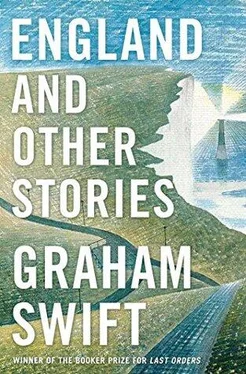His mother hadn’t met him in any case, that afternoon, at the school gates. He was eight years old and he didn’t need his mother to meet him. The school wasn’t much further away than the church. But she was one of those mothers who’d still turn up, perhaps because she was the Vicar’s wife. And he was one of those kids who, though he might have preferred his mother not to turn up, was secretly glad that she did.
But this time it was his father. It was a cold grey day in March. A mean buffeting wind was blowing. It was also the last day of term before the Easter holiday, and he wondered, though there was no logic to it, whether it was because of this that his father and not his mother had come to meet him.
He certainly hadn’t known then that his father would be dead by Christmas. Nor could his mother have known, nor even his father himself. He wasn’t well and he looked tired, standing by the school gates, but not especially ill. He’d been clearly able to manage the walk to the school, something that would prove impossible soon. He’d been told by his doctor that he shouldn’t overdo things, at just the time, around Easter, when his duties were particularly demanding, but he’d made a joke about this. There was a deputy vicar lined up to take at least some of the services, and since ‘vicar’ meant deputy anyway that meant there was a deputy-deputy.
It had disappointed him to be told that a vicar was only a deputy. It seemed like a mark of unimportance. And he’d been troubled by the idea that a doctor could tell a vicar what to do.
They’d walked back together. He felt that his father had come to the school gates in order to tell him something, to have his exclusive attention as they returned home. But something — perhaps the evil wind, constantly sending up clouds of dust and grit as they walked — had forestalled this.
It was anyway only when they got back that he realised his mother wasn’t at home. He’d assumed she’d simply indulged his father’s whim, but now his father said, ‘Mum’s sorry she couldn’t meet you, but she’ll be home any moment.’ It was said in a way that made him understand he shouldn’t ask why. In any case, almost in the same breath, his father said, rather strangely, ‘Easter is coming.’ It was hardly necessary to say it, everyone knew Easter was coming, but since he’d said it so quickly after what he’d said about his mother it made him think that Easter was like a person too who’d turn up at any moment — from wherever it was that Easter went.
His father put the kettle on and cut a thick slice of bread which he plastered with butter, then with strawberry jam. This was his regular reward for coming home from school. His father was doing exactly what his mother would normally do, though he was doing it, sleeves rolled up, with his sinewy arms, which for the first time he’d thought were not like a vicar’s arms, but just like any man’s arms.
They took their tea, and the bread and jam, into the front room. They used their front room regularly. A lot of people seemed not to do this — they reserved their front rooms for special occasions. Perhaps their own case was different because the house was a vicarage and because from the front room you could see the church. From where his father now chose to sit he couldn’t have seen the church — you had to be close to the window — but he sat so that he was nonetheless looking out, at their gate and the privet hedge juddering in the wind. It was clear that he wanted to say something.
It was St Peter’s Church and it was only a coincidence that it was Peter Wilson. There were lots of Peters. His own name was Paul. There was a St Paul too. Since his father was the Vicar of St Peter’s, he’d absorbed a few facts, even when he was very small, about St Peter. That his symbol was the crossed keys. That these keys represented the keys to heaven, since St Peter was the keeper of the gates to heaven. That Jesus had once said to St Peter that he was the rock on which he’d build his church, since the name Peter was also just an ordinary word meaning ‘rock’. It had seemed to him that, with all these attributes, Peter must be the best and most important of all the saints. So he’d been proud and glad that his father was the Vicar of St Peter’s.
But his father now said, with the tiredness in his face showing in the light from the window, that St Peter had once been no kind of saint at all. It was like his remark about Easter. It came from nowhere and seemed to be heading nowhere, but he said it with some emphasis. He said it was important to understand this. St Peter had once been no saint at all. Then he said, and this was a rather shocking remark, that it was important to understand too that there had once been no such thing as Easter.
It became rather difficult to eat his bread and jam. It felt wrong while his father was pronouncing such things. It had been wrong perhaps of his father to prepare it for him. But his father had only been doing, decently, what was expected, what his mother would have done. And, until moments ago, he’d been a hungry boy, home from school.
He’d remember always that slice of bread — it was rather thicker than his mother would have cut — that he wasn’t able, even with an effort, to finish. His father must have seen his struggle, but, caught in a quandary of his own, been unable to say anything. He was talking about St Peter.
He’d remember always his challenging bread and jam, the blue-orange glow of the gas fire, which his father had turned on, and the noise behind him, through the window, of their gate knock-knocking in the wind.
‘Can you imagine that?’ his father had said. ‘Can you imagine when there wasn’t any such thing as Easter?’
He couldn’t. Easter was something that came round every year, like birthdays and holidays, like Christmas. Then his father had told him the story that, even at eight, he probably mostly knew, and even knew mostly from his father. But his father had never told it like this, as if it were a story that had never been told before.
It was important to remember that there’d once been no such thing as Easter. It was important to remember that when Jesus spoke to Peter on the night before Good Friday it wasn’t the night before Good Friday, because Good Friday didn’t exist then. There was no such thing. And Peter wasn’t a saint either. He was just Peter. But this was nonetheless the night, the real and actual night before Jesus was put on the cross, if no one but Jesus understood it. Peter didn’t understand it, and didn’t believe it when Jesus said to him that before the cock crowed in the morning he, Peter, would deny him three times. Peter didn’t know what was happening. He was only Peter.
Jesus had gone to a place to pray, and though he knew what was to come he’d begged God to spare him. He’d said, ‘Let this cup pass from me.’ All through the night Jesus had stayed awake and prayed, but the three disciples who were with him had just slept in a huddle close by. Despite what their master was going through, they’d just slept. One of them was Peter.
More than once Jesus had woken them, but they’d just slept again, even at such a time. Because their eyes were heavy, his father had said, and they were only human. They didn’t really know what was happening. Jesus had already that night named the disciple, Judas, who would betray him, but he’d said to Peter too those words about the cock crowing. Even knowing this, Peter had just slept.
His father had said all these things not like a vicar speaking in church, but as if they were being said for the first time. Some of his father’s words were just words from the Bible and perhaps, even at eight, he knew this, but he felt them, saw them, like real things. He felt the weight of the disciples’ eyes. Saw that cup, though it was only a cup in Jesus’s mind. Felt the passing of that long night and the stern exactness of those three times.
Читать дальше












